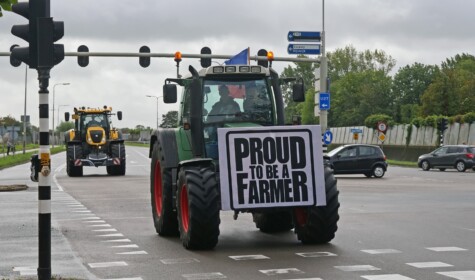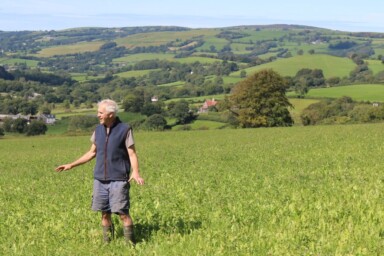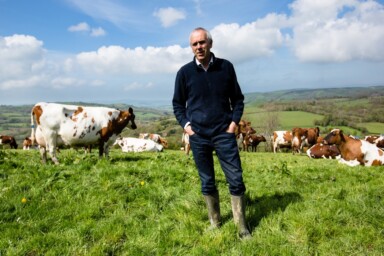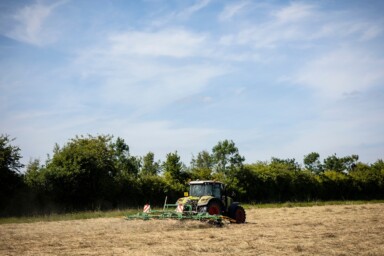SFT CEO, Patrick Holden, considers the farmer protests taking place across the UK and parts of Europe, and discusses what he believes to be the necessary steps to rectify the situation, including the redirection of farming subsidies.
How can we best understand and relate to the farmer protests which are going on all over Europe, including down the road from our farm in West Wales? The regional TV news on Monday 20th February ran a big piece featuring Mark Drakeford, the Welsh First Minister, Lesley Griffiths, Minister for Rural Affairs and others, covering the protests and the Government’s defence of the new Sustainable Farming Scheme, with both the Welsh farmers’ unions, NFU Cymru and the Farmers Union of Wales, out on their tractors blocking the A48, putting out slogans like “enough is enough”, and reminding anyone who will listen that subsidies have bought us cheap food and that farmers deserve to keep on receiving them.
Equivalent demonstrations have been taking place in the Czech Republic, with tractors invading Prague and farmers staking out the ministry of agriculture building; in France, where farmers tried to block Rungis, the largest food market in the country; in Germany, where the farmers are up in arms about the proposed cut in red diesel subsidies; in Holland, where the Dutch Government introduced payments to farmers to get out of dairy farming – which caused such a reaction that the farmers formed a political party and toppled the Government!
Of course, the situation in the EU is marginally different from the UK, mainly because they have the Common Agricultural Policy with the proposed green reforms, whereas we have post-Brexit subsidy packages which are moving in an environmental direction.
However, in essence, the issues are similar because the background to this is common. The farming community have been receiving what amounts to social security payments in the form of an annual subsidy cheque, to which few conditions have been attached as to the kind of farming system that is preferred, leaving individual farmers to adopt what they perceive to be the best practice to stay in business.
However, this is now changing, as a result of the growing realisation that 50 years of intensive farming has had a devastating impact on climate change, nature and society, including damage to public health. Accordingly, new policies are being designed which restrict future subsidies only to farming systems which deliver so-called ‘public goods’.
As I’ve listened to all these news bulletins, I’ve tried to put myself in the place of the farmers who are protesting and I actually do feel a certain degree of empathy with them. After all, they have simply been following the money! This is because the subsidies have been unconditional and the market has been brutal; they have used, as the NFU likes to say, ‘all the tools in the toolbox’, i.e., nitrogen fertiliser and pesticides, to continuously increase their food production in order to stay in business. But unfortunately, this has been at the expense of our natural capital, climate and food quality. So, you can hardly blame them – after all, they were playing by the rules.
But now, the position that these farmers find themselves in, is that they have become commodity slaves, encouraged by the supermarkets and food companies to produce the cheapest possible milk, beef, grain and vegetables. The retailers and food companies don’t even refer to buying crops anymore. They call themselves “offtakers”, which rather summarises their parasitic attitude toward the farmers.
Driven by supermarket price wars, retailers have been relentlessly pushing down the price that they offer to the farmers that supply them, who, when faced with this price pressure, have perceived the only option left to them is further intensification and enlargement of their farming operations and, in the case of livestock, animal numbers. Worse still, many of them have invested large amounts of money in huge buildings to house factory farmed animals, and they are financially exposed with no alternative deployment for the infrastructure they have borrowed on.
I bumped into a neighbour the other day, who has a small family farm with maybe a couple of hundred acres; they used to be a dairy farm, but gave up due to the aforementioned price pressures, and switched to beef cattle and sheep. This is typical of quite a large number of farmers around here. They didn’t join the rat race and further intensify, instead they quietly accepted their fate, perhaps downsizing a little and supplementing their income with a day job. He asked me, “What is your take on the protests?” Before I could answer, he immediately chipped in, “The big boys have spoiled it for everyone else.”
In those few short words, he got pretty close to the truth! Of course, the big dairy, chicken and even beef producers who have invested heavily in new equipment and buildings are dismayed at the prospect of no longer receiving the area-based Single Farm Payment, particularly as their margins are relatively tight at the moment.
However, as the Wales First Minister said, why should Government give public money to farming practices which cause damage to climate, nature and people? The answer is they shouldn’t, of course, but since these protesting farmers are vociferous and have a big influence on the National Farmers Union and the Farmers Union of Wales, the voices cannot be ignored.
Has the Welsh Government got everything right with their outline proposals for the Sustainable Farming Scheme? Not completely, although if you read through the framework, they’ve not made a bad go of it and it still has the status of a consultation. The main policy feature that the intensive farmers highlight, when asked what they are really upset about, is the requirement that 10% woodland and 10% natural habitat is allotted on farm, which they see as a demand to take 20% of their land out of production.
It’s hard to object to this, but interestingly on our own farm we do have a problem with this approach. It goes back to the ‘land sparing’ versus ‘land sharing’ argument. If you are already farming in harmony with nature, it does grate a little to be asked to take even more land out of production. There’s probably a way of reconciling it, which is, of course, what we will try to suggest to the policy team at Welsh Government. Why not allow overgrown hedges to be treated as woodland and reward farmers handsomely for planting more trees, leaving the choice with the individual producer? I feel reasonably optimistic that we can persuade the policymakers to soften that requirement, something that they are definitely open to.
Interestingly, the new Welsh scheme looks quite positive for organic farmers, which is encouraging. Regardless of whether you are intending to farm organically, the idea of supporting a farming system designed around the principles of sustainability and not just the bits and pieces – the kind of pick and mix menu which most of the schemes now constitute – I think is the best way forward.
So, who is ultimately to blame for the farmer protests and the resulting political mess that we find ourselves in? Arguably, it is us, the consuming public. After all, most of us have become accustomed to buying cheap food, deceived into thinking this is okay by a pricing system which is fundamentally dishonest, because it doesn’t reflect the damage done by intensive farming.
The farmers are not wrong actually, when they say it is the subsidies that enable us all to have cheap food. But the problem is the subsidies have been misdirected, encouraging farmers to intensify and industrialise, instead of farming in harmony with nature. Although we might not have been aware of this, we have been complicit in precipitating the European farming crisis, due to the relentless race to the bottom when it comes to food pricing.
Of course, this is not the end of the story. Over the last couple of days, politicians have been debating the future of agricultural support at the annual conference of the National Farmers Union, and although the press has been covering the story, it is not yet clear whether we can redesign subsidies to enable a just transition, not just for the people who eat food, but also for the farmers themselves, many of whom are really struggling to stay in business at the moment.
The issue is of enormous importance, because if the subsidies can be correctly redirected, farmers could move from being part of the problem to becoming part of the solution, rebuilding the lost soil carbon, reinstating in-field biodiversity and improving the social and cultural impacts of food systems throughout the world. To achieve this, will require the introduction of new forms of agricultural support, not just from governments, but from businesses, banks, investors, insurance companies, utility companies, and of course, food companies, all of whom need to collaborate on redesigning the financial framework on which farmers operate.
We also need to resolve the current stand-off between farmers and government policymakers. It is deeply concerning that farmers have become angry and the debates polarised. A representative of the Nature Friendly Farming Network said on Farming Today that people like him were being intimidated by the demonstrations, frightened to speak out in defence of at least part of the Welsh Government policy proposals package. I, for one, would certainly be very happy to go and meet representatives of the NFU to make the case for reconciliation and constructive debate.
I sent an email to NFU Cymru this morning, suggesting that the Welsh Government’s own commissioned analysis of the impact of the introduction of the new policy package (suggesting major net job losses) was probably wrong. I would go so far to say that if truly sustainable farming practices replaced the current extractive model, agricultural employment would almost certainly increase, especially if there were also incentives introduced for re-localising Welsh food systems. On our own farm, the processing of our milk into cheese has resulted in the creation of five additional full-time equivalent posts.
This is because the old model of extractive industrial farming with centralised processing and distribution, necessitates shedding labour at great social and environmental cost, whereas the new model should be a net job creator!
Patrick also spoke about these issues on Radio Wales this morning. You can listen to Patrick’s interview here, from 13:40.
Featured image courtesy of Wikipedia Commons.







